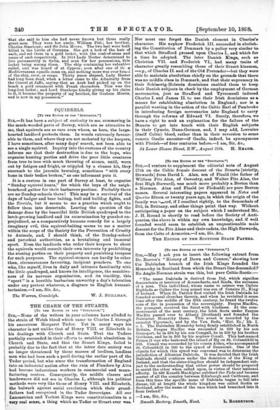THE CHARM OF THE STUARTS.
[To THE EDITOR OF THE " SPECTATOR."3
SIR,—None of the writers in your columns have alluded to the strain of Welsh blood which came to Charles I. through his ancestress Margaret Tudor. Yet in many ways his character is not unlike that of Henry VIII. or Elizabeth in his dealings with Church and State. That the Tudors partially succeeded in their efforts to establish absolutism in Church and State, and that the Stuart Kings, failed is probably due to the fact that at the latter date society was no longer threatened by those masses of lordless, landless men who had been such a peril during the earlier part of the Tudor period, but who since the transformation of England into an industrial nation after the ruin of Flanders by Alva had become industrious workers in commercial and manu- facturing centres. Consequently, the middle classes and landowners did not see in Charles I., although his political methods were very like those of Henry VIII. and Elizabeth, the bulwark against social revolution which their grand- fathers had recognised in the Tudor Sovereigns. All our Lancastrian and Yorkist Kings were constitutionalists in a very real sense, a thing which no Tudor or Stuart ever was. Nor must one forget the Danish element in Charles's character. His nephew Frederick III. succeeded in abolish- ing the Constitution of Denmark by a policy very similar to that which Strafford pressed upon Charles I., and which for a time he adopted. The later Danish Kings, such as Christian VII. and Frederick VI, had many traits of character greatly resembling those of their Stuart kinsmen, —e.g., of Charles II. and of the Old Pretender—but they were able to maintain absolutism chiefly on the grounds that there was no middle cies@ in Denmark, and that their supremacy in their Schleswig-Holstein dominions enabled them to keep their Danish subjects in check by the employment of German mercenaries, just as Strafford and Tyrconnell induced Charles I. and James IL to use their Irish dominions as a means for establishing absolutism in England ; nor is a parallel wanting in the action of the Celtic Earl of Pembroke in introducing foreign mercenaries into England to carry through the reforms of Edward VI. Surely, therefore, we have a right to seek an explanation for the failure of the Stuarts to get into touch with their English subjeots in their Cymric, Dano-German, and, I may add, Lorraine (itself Celtic) blood, rather than in their reversion to some remote Gaelic ancestor—if Gaelic, indeed, be synonymous. with Pictish—of four centuries before.—I am, Sir, &c., 21 Lower Sloane Street, S.W., August 28th. H. RRIDE.


































 Previous page
Previous page